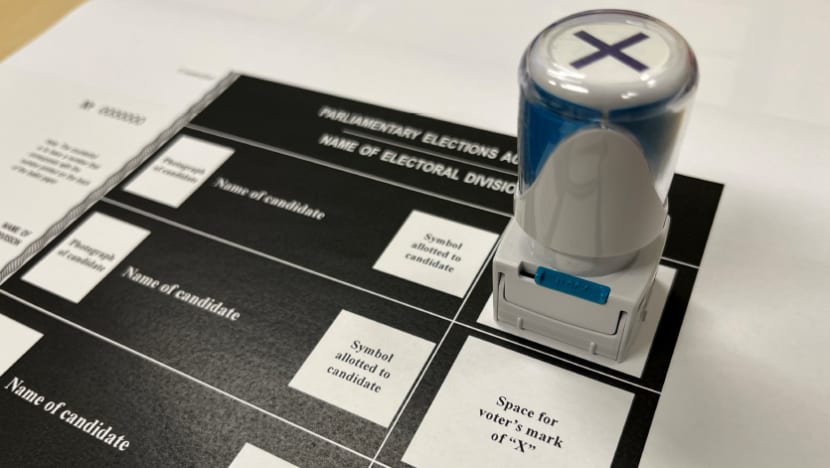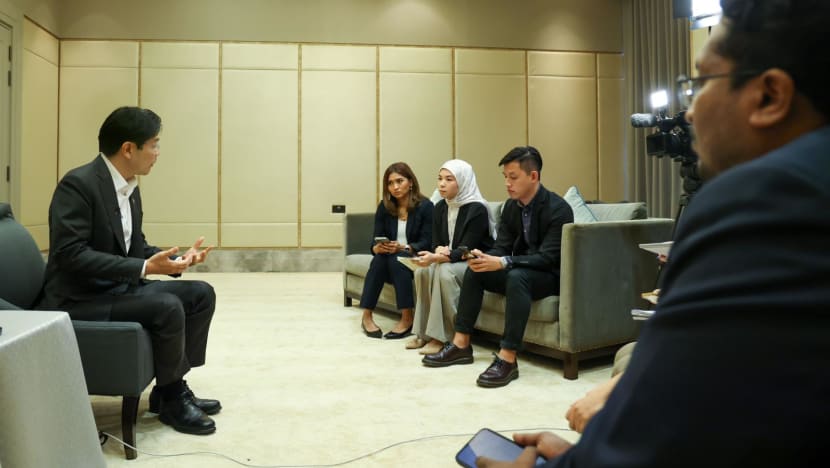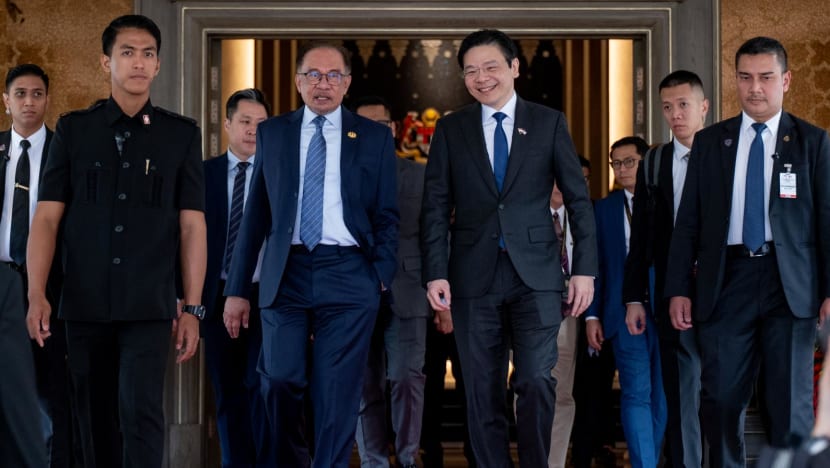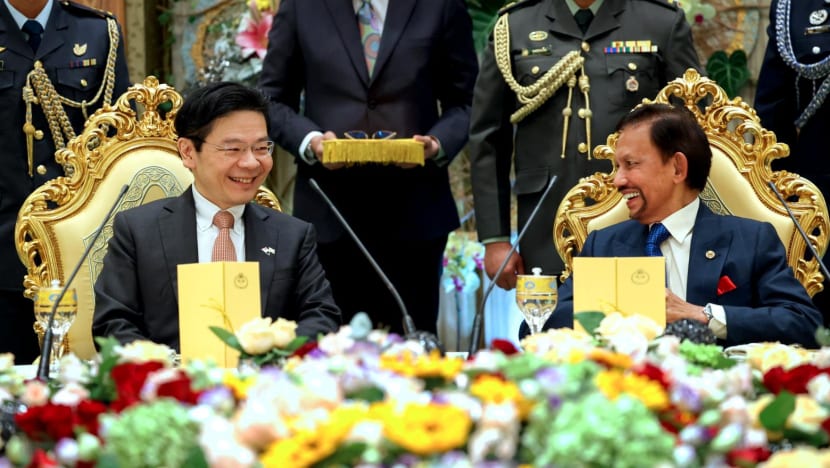'Still a lot of work to be done' at home and abroad: PM Wong on GE timing
“Eventually, at the time when we decide it's appropriate and the election has to be called, people will know,” said Prime Minister Lawrence Wong at the end of his trip to Brunei and Malaysia.

A ballot paper and X-stamp. (Photo: Elections Department)

This audio is generated by an AI tool.
KUALA LUMPUR: Speculation has been rife about the timing of Singapore’s next General Election, with some suggestions it could be in the next few months, but Prime Minister Lawrence Wong said on Wednesday (Jun 12) there is “still a lot of work to be done” on both the domestic and foreign front.
Speaking to the media at the end of his introductory visits to Brunei and Malaysia, Mr Wong was asked if his upcoming flurry of overseas trips for meetings means voters can rule out an electoral contest within this year.
Mr Wong said that the calendar of high-level international and regional meetings taking place in the coming months “is quite clear” and that such meetings “are not secret”.
“You know when there is an ASEAN (Association of Southeast Asian Nations) meeting, there's an APEC (Asia-Pacific Economic Cooperation) meeting, when there's a G20 meeting. You know when they are held in the schedule and in the calendar this year,” he said.
“So you can already mark out which are the dates when I will be busy, when I will be away and which are the dates when I will be in Singapore. So it's really for people to speculate.”
The 44th ASEAN Summit will be held in Vientiane, the capital of Laos, from Oct 6 to 11, while Brazilian capital Rio de Janeiro will host the G20 Summit on Nov 18 and 19. The APEC Economic Leaders’ Meeting will also be held in Peru in November this year.
There has been much buzz over the timing of the next General Election ever since the transition to the country’s fourth-generation leadership led by Mr Wong. He was sworn in on May 15.
Political analysts had cited September this year as a potential slot.
Singapore’s next General Election is due by November next year.
“Eventually, at the time when we decide it's appropriate and the election has to be called, people will know.
"Same for the EBRC (Electoral Boundaries Review Committee). Eventually when it is convened and it has done its work, people will know and then I suppose everyone will get ready for the elections,” said Mr Wong.
Convening the EBRC is a necessary step before calling a General Election. The committee had not been formed as of Jun 3.
“But for now, there's still a lot of work to be done, both for our own domestic agenda and also for me … to engage with our external partners and to take Singapore forward.”

IMPORTANCE OF FOREIGN POLICY
“I know that foreign policy is probably not the top thing that people in Singapore will tell you is top of their mind concerns,” said Mr Wong.
Top of people’s minds will always be domestic issues, such as the cost of living, jobs and housing, he noted.
However, being able to navigate through a very complex external environment is also very critical for a small country like Singapore, said Mr Wong.
“We are not a large country, so large that we can afford to just focus internally all the time. We are a small country, and the reality is we do not operate in a vacuum,” he said.
“We need to continually, especially in this new global environment, think of ways to strengthen partnerships, build connections and advance our interests abroad so that we can enlarge the space in which we operate in order to bring benefits for our people.”
Mr Wong shared that the work of the Prime Minister, while largely domestic, has quite a large element which involves external engagements.
“In fact, I only came to realise it much later in my working experience. When I was a young civil servant starting out, a lot of the work I did was very much domestic-centric, and I worked in ministries that were more domestic-focused,” he said.
He added that the perspective towards foreign policy has also changed across the civil service, with every ministry now having an international relations department and an active external engagement strategy.

OPTIMISTIC IN RESOLVING OUTSTANDING ISSUES
Mr Wong said he is optimistic about working with his Malaysian counterpart to settle outstanding bilateral issues, and noted that there are positive areas of cooperation between the two sides, along with new areas that can be identified down the road.
During a joint press conference earlier in the day, Malaysian Prime Minister and Finance Minister Anwar Ibrahim had said it would be “marvellous” if issues, such as water, airspace and maritime boundaries, could be resolved by the next Singapore-Malaysia Leaders’ Retreat at the end of this year.
Mr Wong told the media that these are longstanding issues, but he nonetheless is approaching the negotiations with good faith and hoping for the best outcomes.
“My predecessor Senior Minister Lee (Hsien Loong) had hoped to resolve them before he handed over to me, but it didn't materialise,” he said.
“Still, I think he had a very good leaders’ retreat last year with PM Anwar and they agreed or they discussed how to move forward on each of these issues. There are mechanisms in place for the officials to talk, they have been doing so.”
He described his meeting with Mr Anwar as candid and fruitful, and said he hopes both sides can indeed make good progress on the issues.
“Certainly, if we can, that will be excellent. But even if we can't, so long as we are making progress, closing the differences and then identifying what are the key issues that we need to resolve, and hopefully on airspace, water, maritime delimitation, the differences narrow,” said Mr Wong.
“I think if we are able to do so that would still be a very good outcome, and then we continue on.”
UPHOLDING INTERNATIONAL LAW
Mr Wong noted that the rule of international law and freedom of navigation are among the key interests which Singapore and other ASEAN countries want to uphold.
For instance, not all countries in the regional bloc are claimant states in the South China Sea dispute, including Singapore, noted Mr Wong.
“But I believe all ASEAN countries would be concerned about freedom of navigation, freedom of overflight, and the need to resolve these disputes in a way that's consistent with international law, and also in a way that is done peacefully and without bringing about escalation or doing anything that may bring about miscalculations or conflicts,” he said.
“So even though not everyone is a claimant state, I think all ASEAN countries have an interest in steering outcomes in that direction.”
He said that the regional bloc is negotiating a code of conduct with China regarding South China Sea, and that Singapore will continue to play its part in helping to steer discussions and negotiations.
Among the claimant states in the territorial dispute are ASEAN nations Brunei, Malaysia, the Philippines, Vietnam and Indonesia.

MOVING FORWARD WITH BRUNEI AND MALAYSIA
Mr Wong reiterated that Singapore and Brunei have a “special relationship” and that “there is no one else really, that has that kind of status where Singapore is concerned”.
When the Brunei sultan made a state visit to Singapore in 2022, both sides signed memoranda of understanding in food security, medical supply chains, sustainable and green energy, as well as civil service and educational exchanges, said Mr Wong.
“So those are very good starting points. And some of these have only just started. Civil service exchange, only just one or two batches, same for education. We want to do more. And on food, we're starting to import eggs, and there could be other possibilities,” he said.
With Malaysia, both sides are open to discussing other possibilities to tap on the complementarities between the two economies.
“And if we put our minds together, think through the different ways in which we can synergise with each other, then we will be able to attract more investments into our part of the region, between Singapore and Malaysia,” he said.
Mr Wong said that Asia remains the engine of the global economy, but large multinational companies want to diversify their exposure in this region instead of just being in one country.
This creates opportunities for Singapore, but other countries will also be looking at gaining a slice of the piece, making the landscape more competitive, he explained.
“And that's why it's even more important between Singapore-Johor and Singapore-Malaysia, to look at ways in which we can really enhance our competitiveness together, rather than think of each other as competition or rivals.”

















